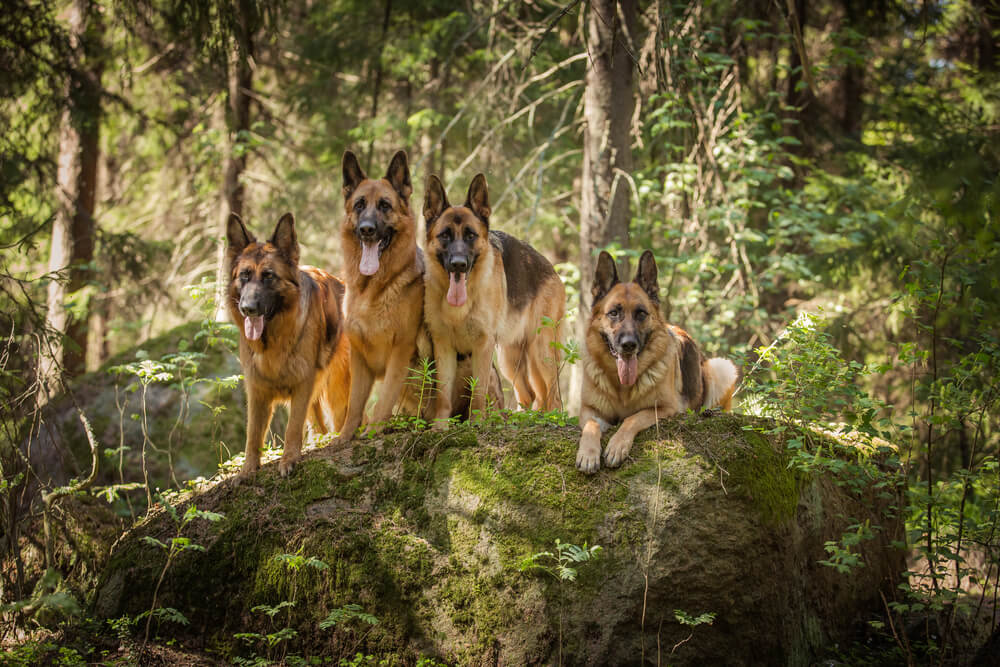
German Shepherds are great companion dogs known for their intelligence and loyalty. They are easily recognizable due to their presence among working dogs of all types, from police canine units to service animals for people with disabilities.
Make sure to do your research before adopting a new pet. Read on to learn more about this wonderful breed, its history, and how to care for your German Shepherd properly.
German Shepherd Breed Overview
German Shepherds are highly intelligent large breed dogs. They are easy to train and make highly loyal and diligent companions.
Because of their high intelligence and eagerness to please, German Shepherds are commonly part of police and military canine units. They are also frequently trained as service animals for people struggling with mental health or physical disabilities.
German Shepherds are also wonderful dogs to welcome into your family. The American Kennel Club has listed German Shepherds in the top five dog breeds in the USA every year since 2013, and we don’t expect that to change anytime soon.
German Shepherds are not hypoallergenic dogs. They are big shedders, so consider this carefully if you have allergies.
History of the German Shepherd
German Shepherds have always been bred as working dogs. They were initially bred to work on farms herding animals. This is why they are known as German “Shepherd” dogs.
As their name implies, modern German Shepherds originated in Germany at the turn of the 20th century. Their ancestors lived and worked on farms in the region for generations prior. Not long after this, Max von Stephanitz began breeding German Shephards for police and military purposes.
German Shepherds rose in popularity as companions and working dogs a few decades later. Then, because of their ease of training and loyal personalities, people worldwide began to seek them out for their next pet.
Interestingly, German Shepherds were referred to only as “Shepherd” dogs during the World War period from 1914 to 1945. This allowed people to continue to adopt and love the breed without acknowledging their German origins during a period of German aggression.
Characteristics of the German Shepherd
German Shepherds have many easily recognizable and well-known characteristics their families know and love.
German Shepherd Appearance
Most German Shepherds exhibit the traditional black and brown coloring throughout their coats.
In addition to this recognizable pattern, you will also find German Shepherds with the following color patterns:
- Black & cream
- Black and red
- Black and silver
- Blue
- Black
- Gray
- White
- Liver
- Sable
German Shepherds are a large breed dog, with an average weight of 65-90 pounds for males and 50-70 pounds for females. However, some are known to grow larger, especially as they age and put on weight.
German Shepherd Temperament
German Shepherds are known for being very social. They are excellent family dogs because they do well with people and children of all ages.
German Shepherds also get along well with most other dogs. Therefore, you are unlikely to see a German Shepherd exhibiting unprovoked aggression towards other dogs unless they have been trained to do so.
German Shepherd Personality
German Shepherds are known for their appearance and intelligence, but many believe their most significant characteristic is their personality.
German Shepherds are famously loyal and love to work alongside their families. Because of their love for the family, they can also be very protective and make excellent watchdogs.
Your German Shepherd’s personality will vary by the individual dog (like all breeds).
German Shepherd Living Needs
German Shepherds will need space to roam. They need plenty of exercise and thrive in large fenced-in yards where they can run and play.
German Shepherds are social animals who will not thrive when isolated for most of their day. If you or other household members will not be home to spend time with your dog, you might consider choosing a different breed.
Some apartment-dwellers will adopt German Shepherds, but most agree that these large active dogs are much happier in a house. Houses tend to have more space and are more likely to have an outdoor space for your German Shepherd to enjoy.
German Shepherd Life Expectancy
Like all large and giant breeds, German Shepherds have a shorter life expectancy than smaller dogs. Germany Shephards live for an average of seven to ten years. However, some will live as long as 15 years if they are in excellent health and receive good care throughout their lives.
German Shepherd Care
German Shepherds require a lot of care and attention from their owners to thrive.
Your German Shepherd could develop behavior issues or become depressed without adequate exercise and mental stimulation.
Training & Exercise Needs
German Shepherds are very active dogs that require significant exercise for their physical and mental health. They love to participate in walking, jogging, tracking, herding, or even dock diving.
German Shepherds are intelligent dogs that are easy to train. You can spend time working with your dog on your own or enroll in a dog training class.
German Shepherds will also require mental stimulation every day. You can provide this by giving your German Shepherd brain-teaser toys, slow-feeding balls, or engaging in training often.
If you fail to provide your German Shepherd with the physical and mental exercise they require, you will likely see significant behavioral issues begin to develop. These behavioral problems often include barking, chewing, or digging.
If your German Shepherd displays these behaviors, consider increasing their physical and mental stimulation during the day. This can help resolve these issues and keep your dog happy and healthy.
Socialization
It’s best to allow your German Shepherd to socialize with people and other dogs from a young age. Consider taking them to a dog run or puppy training class where they can meet other puppies.
German Shepherds also benefit from family time and activities with their household. They like to be part of the action and will not respond well to being closed off or separated from others.
Grooming
There’s no getting around it—German Shepherds shed a lot. The shedding will increase at specific points throughout the year as your dog’s coat changes with the seasons.
Your German Shepherd will also enjoy being brushed every few days. This is an excellent opportunity to bond with your pet and reduce the shedding.
Despite shedding often, your German Shepherd will not require extensive grooming. Their coats do not need to be groomed nearly as often as many other breeds. They also will not require much more maintenance than an occasional bath unless you want to style their coat in a particular way.
German Shepherds who spend significant amounts of time outdoors in rocky areas might wear down their nails without assistance. However, you should check them periodically to trim them if they become long or uncomfortable.
German Shepherd Health
Although the breed can be susceptible to health issues, most reputable breeders will screen their dogs for indicators before they breed. These screenings search for degenerative myelopathy and elbow/hip dysplasia.
If you adopt a German Shepherd puppy, it is best to wait until your pup is over one year old before getting them neutered or spayed. This article from UC Davis concluded that completing the procedure before one year old can result in joint disorders in males and female incontinence issues.
Bloat
German Shepherds are deep-chested dogs, making them susceptible to an infamous condition known as bloat. This stomach twisting can occur from eating before exercise, overeating, or eating too fast. Unfortunately, it is almost always fatal.
However, you can ask your veterinarian to perform a gastropexy when your pet is fixed. This simple procedure attaches the stomach to the abdominal wall to prevent bloat from occurring.
If you decide against this surgery, avoid bloat by restricting meals before exercise and carefully regulating the amount of food you feed your German Shepherd.
For example, establish a routine in your household where only one family member feeds your dog. This will avoid accidental double-feeding that could increase the risk of bloat.
Another suggestion is to provide multiple small meals instead of one large daily meal. This is essential if your German Shepherd finishes all the food in his dish in one sitting instead of gradually eating the meal throughout the day.
German Shepherd Nutrition
German Shepherds do well with a diet that helps them maintain their high energy levels and beautiful coats.
Choose a diet high in protein to give your dog an energy boost. It should also include carbohydrates and good fats to keep them moving all day. Don’t forget vitamins and minerals!
Fatty acids in your pup’s diet will keep his coat shiny and healthy. Providing an egg daily can reduce itchiness or other skin issues in German Shepherds.
German Shepherds love to snack on fruits and vegetables. It’s great to provide them with these healthy treats, but be sure to avoid the following off-limits options for your dog:
- Grapes
- Avocado
- Cherries
- Grapefruit
- Lemons and limes
- Currants
- Tomatoes
- Plums
- Garlic
- Mushrooms
- Onions
Avoid a grain-free diet for your German Shepherd despite what you see in advertisements. While these grain-free formulas have recently grown in popularity, studies show they can result in heart issues.
Frequently Asked Questions
Review these frequently asked questions before bringing home your German Shepherd.
Why are so many German Shepherds in police or military canine units?
Contrary to what some believe, German Shepherds do not make up a large portion of canine units because they are mean or unfriendly. It’s actually the opposite.
German Shepherds are excellent at their jobs in the canine unit because they are highly intelligent, easy to train, and have a superb sense of smell. This study found that German Shepherds have the best sense of smell of all breeds common in canine units.
Are German Shepherds good with children?
Yes, German Shepherds are known to be excellent family dogs. You’ll find them spending quality time with your youngest family members or standing guard outside baby bassinets or cribs.
That being said, any dog’s temperament is influenced by its personal history and experiences, so always double-check with a dog’s owner before allowing your children to play with them.
Wrapping Up
German Shepherds are consistently rated one of the most popular breeds in the United States. They are lovely family dogs with bold, loyal personalities. German Shepherds require a lot of care, such as daily exercise, periodic grooming, and plenty of mental stimulation.

